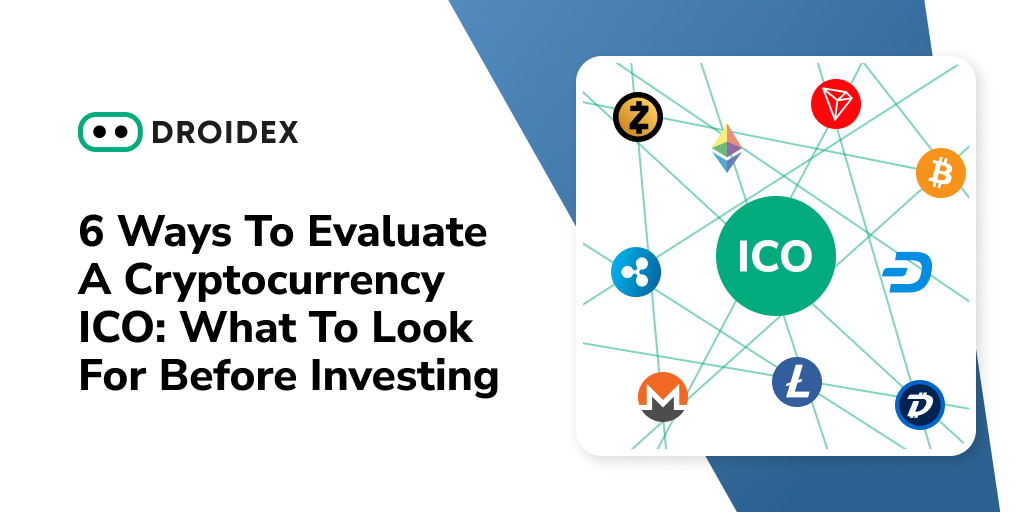Cryptocurrency has revolutionized the financial industry in recent years, and initial coin offerings (ICOs) have become a popular way for start-ups to raise funds. ICOs are similar to initial public offerings (IPOs), but instead of selling shares, start-ups sell digital tokens that represent a stake in their project or product.
However, with the rise of ICOs, there has also been a rise in fraudulent schemes and scams. As an investor, it’s crucial to be able to evaluate an ICO and determine whether it’s worth investing in or not. In this article, we’ll discuss six ways to evaluate a cryptocurrency ICO and what to look for before investing.
The Whitepaper

The whitepaper is the most crucial document to evaluate an ICO. It’s a detailed report that outlines the project, its purpose, and the technology behind it. The whitepaper should explain what the ICO aims to achieve, how it plans to achieve it, and the team behind it.
When evaluating the whitepaper, look for clear, concise explanations of the technology and how it works. It should also explain the problem the ICO aims to solve and the benefits of the solution. Additionally, look for details on the project’s timeline, including the milestones and goals that the team aims to achieve.
The team behind the ICO is also essential. Look for information on their experience, qualifications, and achievements. If the team has a good track record in the industry, it’s a good sign that the ICO is worth investing in. Conversely, if the team’s experience is questionable or non-existent, it’s a red flag.
Market Potential

The market potential is the next thing to consider when evaluating an ICO. The ICO should address a real problem in the market and offer a unique solution. It should also have a large potential market, as this will increase the chances of the ICO’s success.
To evaluate the market potential, look for information on the market size, the target audience, and the potential demand for the ICO’s product or service. You should also consider the competition in the market and how the ICO’s solution stands out from the rest.
It’s also important to consider the potential risks associated with the market. For example, regulatory uncertainty or market volatility can significantly impact the success of the ICO. If the market potential is too risky or unclear, it’s best to avoid investing in the ICO.
Token Economics

Token economics refers to the design and structure of the ICO’s digital tokens. It’s essential to evaluate the token economics to determine the potential value of the tokens and how they will be used.
Look for information on the total supply of tokens, the distribution of tokens, and the token’s utility. The total supply should be reasonable and not too high, as this can lead to inflation and devalue the tokens. The distribution of tokens should also be fair, with a limited number of tokens going to the team and early investors.
The token’s utility is also essential. It should have a clear purpose and use within the project’s ecosystem. If the token has no utility or purpose, it’s not worth investing in. Additionally, consider how the token’s value will increase over time and how it will be affected by market demand.
Security and Transparency

Security and transparency are essential when evaluating an ICO. The project should have a secure infrastructure to protect investors’ funds and personal information. Look for information on the ICO’s security measures, such as multi-factor authentication and encryption.
Transparency is also crucial. The ICO should provide regular updates on the project’s progress and be open to feedback from investors. Look for information on the ICO’s governance structure, such as the role of the community and the decision-making process.
It’s also essential to consider the ICO’s legal compliance. Look for information on the ICO’s regulatory compliance, such as whether it’s registered with relevant regulatory authorities or has sought legal advice. If the ICO is not transparent about its security measures, governance structure, or regulatory compliance, it’s best to avoid investing in it.
Community Engagement

Community engagement is an important aspect of evaluating an ICO. The project should have an active and engaged community that supports it. Look for information on the ICO’s social media accounts, online forums, and community events.
The community should also be supportive of the project’s goals and provide constructive feedback. Look for information on how the project responds to community feedback and how it incorporates feedback into its plans.
If the community is inactive or negative, it’s a red flag that the project may not be worth investing in. Additionally, if the project doesn’t have an active community or doesn’t engage with the community, it’s a sign that it may not be invested in the long-term success of the project.
Due Diligence
Due diligence is the final step in evaluating an ICO. It’s essential to do your own research and verify the information presented in the whitepaper and other project materials. Look for information on the team’s background, the project’s market potential, and the token economics.
Additionally, consider seeking advice from industry experts or consulting with legal professionals. They can provide valuable insights and help you evaluate the project’s potential risks and rewards.

Conclusion
Evaluating an ICO can be a daunting task, but it’s crucial to avoid scams and make informed investment decisions. When evaluating an ICO, consider the whitepaper, market potential, token economics, security and transparency, community engagement, and due diligence. By considering these factors, you can make informed investment decisions and avoid fraudulent schemes.

